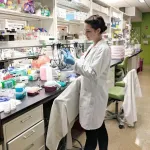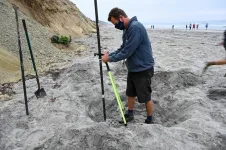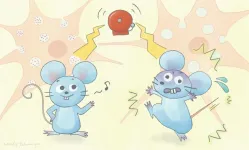(Press-News.org) COLUMBUS, Ohio - A single positive experience on a psychedelic drug may help reduce stress, depression and anxiety symptoms in Black, Indigenous and people of color whose encounters with racism have had lasting harm, a new study suggests.
The participants in the retrospective study reported that their trauma-related symptoms linked to racist acts were lowered in the 30 days after an experience with either psilocybin (Magic Mushrooms), LSD or MDMA (Ecstasy).
"Their experience with psychedelic drugs was so powerful that they could recall and report on changes in symptoms from racial trauma that they had experienced in their lives, and they remembered it having a significant reduction in their mental health problems afterward," said Alan Davis, co-lead author of the study and an assistant professor of social work at The Ohio State University.
Overall, the study also showed that the more intensely spiritual and insightful the psychedelic experience was, the more significant the recalled decreases in trauma-related symptoms were.
A growing body of research has suggested psychedelics have a place in therapy, especially when administered in a controlled setting. What previous mental health research has generally lacked, Davis noted, is a focus on people of color and on treatment that could specifically address the trauma of chronic exposure to racism.
Davis partnered with co-lead author Monnica Williams, Canada Research Chair in Mental Health Disparities at the University of Ottawa, to conduct the research.
"Currently, there are no empirically supported treatments specifically for racial trauma. This study shows that psychedelics can be an important avenue for healing," Williams said.
The study is published online in the journal Drugs: Education, Prevention and Policy.
The researchers recruited participants in the United States and Canada using Qualtrics survey research panels, assembling a sample of 313 people who reported they had taken a dose of a psychedelic drug in the past that they believed contributed to "relief from the challenging effects of racial discrimination." The sample comprised adults who identified as Black, Asian, Hispanic, Native American/Indigenous Canadian, Native Hawaiian and Pacific Islander.
Once enrolled, participants completed questionnaires collecting information on their past experiences with racial trauma, psychedelic use and mental health symptoms, and were asked to recall a memorable psychedelic experience and its short-term and enduring effects. Those experiences had occurred as recently as a few months before the study and as long ago as at least 10 years earlier.
The discrimination they had encountered included unfair treatment by neighbors, teachers and bosses, false accusations of unethical behavior and physical violence. The most commonly reported issues involved feelings of severe anger about being subjected to a racist act and wanting to "tell someone off" for racist behavior, but saying nothing instead.
Researchers asked participants to recall the severity of symptoms of anxiety, depression and stress linked to exposure to racial injustice in the 30 days before and 30 days after the experience with psychedelic drugs. Considering the probability that being subjected to racism is a lifelong problem rather than a single event, the researchers also assessed symptoms characteristic of people suffering from discrimination-related post-traumatic stress disorder (PTSD).
"Not everybody experiences every form of racial trauma, but certainly people of color are experiencing a lot of these different types of discrimination on a regular basis," said Davis, who also is an adjunct faculty member in the Johns Hopkins University Center for Psychedelic and Consciousness Research. "So in addition to depression and anxiety, we were asking whether participants had symptoms of race-based PTSD."
Participants were also asked to report on the intensity of three common kinds of experiences people have while under the influence of psychedelic drugs: a mystical, insightful or challenging experience. A mystical experience can feel like a spiritual connection to the divine, an insightful experience increases people's awareness and understanding about themselvess, and a challenging experience relates to emotional and physical reactions such as anxiety or difficulty breathing.
All participants recalled their anxiety, depression and stress symptoms after the memorable psychedelic experience were lower than they had been before the drug use. The magnitude of the positive effects of the psychedelics influenced their reduction in symptoms.
"What this analysis showed is that a more intense mystical experience and insightful experience, and a less intense challenging experience, is what was related to mental health benefits," Davis said.
The researchers noted in the paper that the study had limitations because the findings were based on participant recall and the entire sample of recruited research volunteers had reported benefits they associated with their psychedelic experience - meaning it cannot be assumed that psychedelics will help all people of color with racial trauma. Davis and Williams are working on proposals for clinical trials to further investigate the effects of psychedelics on mental health symptoms in specific populations, including Black, Indigenous and people of color.
"This was really the first step in exploring whether people of color are experiencing benefits of psychedelics and, in particular, looking at a relevant feature of their mental health, which is their experience of racial trauma," Davis said. "This study helps to start that conversation with this emerging treatment paradigm."
INFORMATION:
This work was funded by the University of Ottawa, the Canada Research Chairs Program and the National Institutes of Health. Additional co-authors included Yitong Xin of Ohio State's College of Social Work; Nathan Sepeda of Johns Hopkins; Pamela Grigas and Sinead Sinnott of the University of Connecticut; and Angela Haeny of Yale School of Medicine.
Contact:
Alan Davis,
Davis.5996@osu.edu
Written by Emily Caldwell,
Caldwell.151@osu.edu;
614-292-8152
Cancer cells are known for spreading genetic chaos. As cancer cells divide, DNA segments and even whole chromosomes can be duplicated, mutated, or lost altogether. This is called chromosomal instability, and scientists at Memorial Sloan Kettering have learned that it is associated with cancer's aggressiveness. The more unstable chromosomes are, the more likely that bits of DNA from these chromosomes will end up where they don't belong: outside of a cell's central nucleus and floating in the cytoplasm.
Cells interpret these rogue bits of DNA as evidence ...
BOSTON - Some police departments in the United States continue to teach officers that neck restraints are a safe method for controlling agitated or aggressive people, but that's a dangerous myth, according to a Viewpoint written by three neurologists at Massachusetts General Hospital (MGH) in JAMA Neurology.
The killing of George Floyd, a Black man who died while being arrested in May 2020 after a police officer pressed a knee to his neck for more than eight minutes, helped spark a national conversation about racial ...
Certain bacteria, known as plant-growth-promoting bacteria (PGPB), can improve plant health or protect them from pathogens and are used commercially to help crops. To further improve agricultural yields, it is helpful to identify factors that can improve PGPB behavior.
Many PGPB form sticky communities of cells, known as biofilms, that help them adhere to plant roots. A group of scientists in North Carolina and Massachusetts were interested in finding other plant-associated bacteria that could help PGPB better adhere to plant roots, with the hope that increasing the number of PGPB cells attached to roots would increase their beneficial activities. ...
Scripps Institution of Oceanography at UC San Diego researchers have uncovered how rain and waves act on different parts of coastal cliffs.
Following three years of cliff surveys in and near the coastal city of Del Mar, Calif., they determined that wave impacts directly affect the base, and rain mostly impacts the upper region of the cliffs.
The study appears in the journal Geomorphology and was funded by California State Parks. California's State Parks Oceanography program supports climate adaptation and resilience efforts through coastal and cliff erosion observations and modeling, ...
Below please find a summary and link(s) of new coronavirus-related content published today in Annals of Internal Medicine. The summary below is not intended to substitute for the full article as a source of information. A collection of coronavirus-related content is free to the public at http://go.annals.org/coronavirus.
1. Review concludes universal mask use by lay persons reduces the spread of viral infections including SARS-CoV-2
Findings affirm policy promised by President-Elect Biden, who will ...
What The Study Did: This study identified racial/ ethnic, sex, age, language, and socioeconomic differences in accessing telemedicine for primary care and specialty ambulatory care; if not addressed, these differences may compound existing inequities in care among vulnerable populations.
Authors: Srinath Adusumalli, M.D., M.Sc., of the Hospital of the University of Pennsylvania in Philadelphia, is the corresponding author.
To access the embargoed study: Visit our For The Media website ...
What The Study Did: Severe COVID-19 is characterized by the intense formation of neutrophil extracellular traps (NETs), leading to the blockage of microvessels, as shown in pulmonary samples. The occurrence of ST-elevated myocardial infarction (STEMI) is a serious cardiac manifestation of COVID-19; the intrinsic mechanism of coronary thrombosis appears to still be unknown. This case series report of five patients sought to determine the role of NETs in coronary thrombosis in patients with COVID-19.
Authors: Ana Blasco, M.D., Ph.D., of the Hospital Universitario Puerta de Hierro-Majadahonda in Madrid, Spain, is the corresponding ...
In 1986, cellular biochemist Kazumitsu Ueda, currently at Kyoto University's Institute for Integrated Cell-Material Sciences (iCeMS), discovered that a protein called ABCB1 could transport multiple chemotherapeutics out of some cancer cells, making them resistant to treatment. How it did this has remained a mystery for the past 35 years. Now, his team has published a review in the journal FEBS Letters, summarizing what they have learned following years of research on this and other ATP-binding cassette (ABC) transporter proteins.
ABC transporter proteins are very similar across species and have various ...
Scientists have suspected mutations in a cellular cholesterol transport protein are associated with psychiatric disorders, but have found it difficult to prove this and to pinpoint how it happens. Now, Kazumitsu Ueda of Kyoto University's Institute for Integrated Cell-Material Sciences (iCeMS) and colleagues in Japan have provided evidence that mice with disrupted ABCA13 protein demonstrate a hallmark behaviour of schizophrenia. The team investigated ABCA13's functions and published their findings in the Journal of Biological Chemistry.
ABCA13 belongs to a family of cellular transporter proteins called ATP-binding ...
Philadelphia, December 29, 2020 - Posttraumatic stress disorder (PTSD) is a complex psychiatric disorder brought on by physical and/or psychological trauma. How its symptoms, including anxiety, depression and cognitive disturbances arise remains incompletely understood and unpredictable. Treatments and outcomes could potentially be improved if doctors could better predict who would develop PTSD. Now, researchers using magnetic resonance imaging (MRI) have found potential brain biomarkers of PTSD in people with traumatic brain injury (TBI).
The study appears in ...


